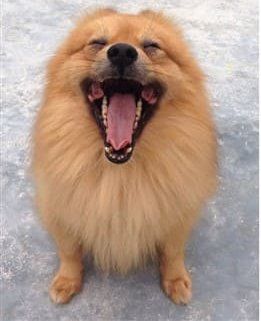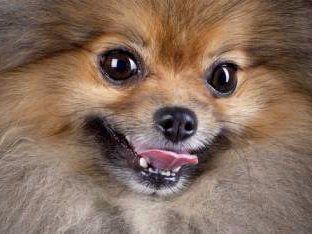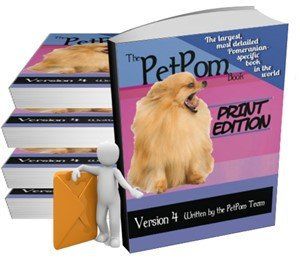Dental Care
PetPom

The
Pomeranian
Information
Center
Pomeranian Teeth and Dental Care
Overview
At-home dental care and taking care of a dog's teeth is one of the most overlooked care tasks. And this is really a shame, because it is also one of the most important.
Here we will go over the vital elements that you should know about.
Why Dental Care is Important
All day, around the clock, plaque is constantly being produced inside a dog's mouth. This is a very sticky film that clings to the teeth.
If it remains on the teeth, it hardens into tartar which is much more difficult to remove.
Both plaque and tartar encase teeth and even travel under the gum line.

-min-261x335-1920w.jpg)
Puppy (this is his name), photo courtesy of Kisharn
It eats away at enamel, gradually causing teeth to rot. As the teeth decay, infection can set it. It not only can cause painful oral infections, but also travel up into a dog's sinuses or even lead to sepsis, which is a full-body infection that can be fatal.
To summarize:
If you do not take care of your Pomeranian's teeth the lack of care can lead to decay, rot, and infection. And this can lead to loose teeth, and eventual tooth loss. And of course this does not happen without a moderate to severe degree of pain.
The Biggest Misconceptions About Dog Dental Care
1)
Many owners assume that a Pomeranian will keep his teeth clean by chewing on toys. This is completely false. While this may remove a small amount of plaque, it by no means is adequate enough for good oral health. It will not keep the teeth free of decay and will do very little to prevent dental problems.
2) Many owners assume that a Pomeranian puppy
does not need his teeth taken care of, since he will be teething and his milk teeth will be falling out. However, decay in milk teeth can affect the adult teeth which are present, but have not yet erupted.
In addition, when you take care of your Pomeranian's teeth, this is also going to keep his gums healthy and strong; and strong gums are the important foundation for his adult set of teeth.
Dental care should begin as soon as you obtain your Pomeranian, whether he is 8-weeks-old or 8 years old.
The Two Elements for Good Oral Health
There are two basic elements:
1.
You will want to take steps at home to keep your Pom's teeth clean.
2.
You will want your Pom's veterinarian to examine the teeth every 1 to 2 years.

Dental care should begin as soon as you obtain your Pomeranian, whether he is 8-weeks-old or 8 years old.
The Two Elements for Good Oral Health
There are two basic elements:
1.
You will want to take steps at home to keep your Pom's teeth clean.
2.
You will want your Pom's veterinarian to examine the teeth every 1 to 2 years.
4 Ways to Keep Your Pom's Teeth Clean
There are several things that you should do to keep your Pom's teeth healthy. While following just one of these methods will help to a certain degree, following more than one (i.e. brushing and
a chew) will ensure that you are taking all steps possible for optimal care and to help prevent decay and infection.
#1 Brush Your Pom's Teeth
Brushing with an appropriately sized canine toothbrush and an effective canine toothpaste
is an important part of at-home dental care.
The toothbrush - You will want the brush to be sized for toy dogs so that it can be maneuvered into the mouth to reach all of the teeth. The brush should have proper bristles that reach the crevices of the teeth.
If you find that your Pomeranian balks at a regular canine toothbrush, you may want to try a finger brush. This is a small rubber piece that fits onto the tip of your finger, so that you can scrub the teeth in this way.
The paste
- Never use human toothpaste, as this can be toxic to dogs due to the fluoride in it. Also, human toothpaste foams, which can cause choking. Canine toothpaste will be fluoride- free, and does not contain any foaming agents. Dogs swallow their toothpaste, so if you obtain a good brand, it will be perfectly safe to ingest.
One like CET Virbac Plaque Tartar Control Enzymatic Toothpaste
 is highly effective in helping to remove plaque, helps to keep breath fresh, and comes in some fantastic flavors like malt, beef, chicken, seafood, and vanilla-mint, which will help your Pom actually look forward to having his teeth cleaned.
is highly effective in helping to remove plaque, helps to keep breath fresh, and comes in some fantastic flavors like malt, beef, chicken, seafood, and vanilla-mint, which will help your Pom actually look forward to having his teeth cleaned.
How often to brush your Pom's teeth
- Ideally, you will want to do this once per day. It can help to have a set schedule for this, such as right after dinner and before your evening walk.
How long to brush your Pom's teeth
- A 2 to 3 minute session is all that is needed, keeping in mind that brushing is just one part of proper oral hygiene.
Training a Pomeranian to tolerate tooth cleanings
- Some dogs do not like to have their teeth brushed and this is usually just a matter of needing to become acclimated to it. In these cases, take a gradual approach:
1. Begin by sitting down with your Pom and in a calm way run your finger over your dog's teeth. Aim for a 1 to 2 minute session of this, and give reward when done.
2. Once your Pom sits still for this, and is used to these regular sessions, move up to the finger brush or toothbrush.
#2 Give a Daily Dental Chew
Another important aspect of removing plaque and keeping decay at bay is to offer a quality canine dental chew every day.
A great dental chew will work in several ways:
- It will actively remove plaque and tartar
- It will help prevent the buildup of these
- It will have the added bonus of helping prevent halitosis (bad breath)
What to look for: You will want to look for a dental chew that your Pomeranian finds tasty so that it is a well-received treat that he looks forward to. You will also want it to be properly sized for toy breeds. And, if your Pom has any dietary restrictions such as a grain-free diet, to meet those requirements as well.
Recommended dental chews for Pomeranians:
There are a few good options. One is GREENIES Teenie Dog Dental Chews . These are the #1 veterinary recommended dental chew. In addition, Greenies was the first brand to receive the Seal of Acceptance for removing plaque and tartar by the Veterinary Oral Health Council.
. These are the #1 veterinary recommended dental chew. In addition, Greenies was the first brand to receive the Seal of Acceptance for removing plaque and tartar by the Veterinary Oral Health Council.
Another great thing about these is that they can be found in various sizes. The 'teenie' size is for dogs 5 to 15 pounds, as is therefore perfect for most Poms. If you have a throwback Pomeranian that is over 15 pounds, you would want to look to the 'petite' size, which is for dogs 15 to 25 pounds.
If you are looking for a wheat-free dental chew, a great one is VeggieDent Dental Chews in Size Extra Small ; this is vegetable-based and also has been awarded the VOHC Seal of Acceptance. This is sized perfectly for toy breeds and works well to keep teeth clean and breath fresh.
; this is vegetable-based and also has been awarded the VOHC Seal of Acceptance. This is sized perfectly for toy breeds and works well to keep teeth clean and breath fresh.
#3 Use an Oral Spray
If your Pomeranian really does not like having their teeth brushed, if you have a Pom that suffers from high levels of anxiety that prevent you from brushing their teeth, and/or if you have a hard time reaching all of your Pom's teeth, an alternative to brushing them is to use a spray.
A good one like Nylabone Advanced Oral Care Dental Spray
 can be used to help remove plaque that is already there, and to use as a preventative measure to prevent buildup. Some owners have visibly seen reduced buildup in as little as a week.
can be used to help remove plaque that is already there, and to use as a preventative measure to prevent buildup. Some owners have visibly seen reduced buildup in as little as a week.
If you opt for this method of keeping your Pom's teeth clean, you'll want to use it every day, spraying both the teeth and the gums.
#4 Add a Dental Supplement to Your Pom's Water
If your Pomeranian is particularly prone to tooth decay and other such issues, you may want to consider using an liquid supplement as well. No matter what the label says, this cannot be used in place of brushing, it simply won't do as good of a job, but can be a very helpful addition to it.
These usually a flavorless liquid that is added to water (typically 1 teaspoon to each one 8-ounces of water), and work to kill bacteria and help prevent plaque buildup and periodontal disease. One like Nylabone Advanced Oral Liquid Tartar Remover
 helps to freshen breath as well.
helps to freshen breath as well.
Professional Veterinary Dental Cleanings
You may wonder if these are really needed if you are taking good care of your Pomeranian's teeth at home. And, many owners want to avoid having this done since it involves placing a dog under anesthesia.
The professional dental cleaning involves two parts; one is to examine the teeth and gums for any issues. This is done both visually and via x-rays. The other element is to resolve any problems that are found.
Since tooth decay is often a silent issue until it has developed into a problem serious and painful enough to cause a dog to have trouble eating, it is a good idea for your Pomeranian to have an exam every 2 to 3 years.
The dental x-ray will be able to identify potential issues that may be under the gum-line including broken teeth and/or roots, periodontal disease, dead teeth, abscesses or infected teeth.
Other steps will involve a full dental cleaning, a scraping (to remove stubborn tartar), and a polishing.
Generally, the anesthesia given is light, the vet will look over your Pomeranian's health record and take a blood sample to help ensure that it is safe to give anesthesia, and if work needs to be done on the teeth a local anesthetic is given as well to improve the safety of the anesthetic procedure.
Red Flag Signs of Serious Dental Issues
One of the most serious problems that dogs can have is developing an abscessed tooth. Take your Pomeranian to the vet if you notice any of the following:
- Red and/or swollen gums
- Bleeding in the mouth
- Discomfort when eating, refusal to eat
- Extreme bad breath
- A visibly cracked tooth
Issues Seen with Young Puppies
During the teething process, it is not uncommon for a milk tooth to still be in place when an adult tooth is emerging. If the milk tooth does not fall out, this will cause the adult tooth to appear behind it and out of place. This is commonly referred to as a double set of teeth, even if it just affects one.
For this, you will want the vet to remove the milk tooth; if not, the adult tooth may end up permanently misaligned and teeth will be crooked. Fortunately, milk teeth have very shallow and small roots, and are often able to be extracted without anesthesia.
In many cases, once this is done the adult tooth will gradually move into place.
Misalignment Issues
The proper bite set of a Pomeranian is a scissors bite. And a Pomeranian's bite set is usually in place by the age of 10 months old. A scissor bite means that the incisor teeth (the front 6 teeth) in the upper jaw are in contact with but slightly
overlap those in the bottom jaw.
If a Pomeranian has an overbite (the upper jaw protrudes out much further than the upper) or an underbite (the lower jaw protrudes out much further), this is referred to as misalignment or malocclusion.
With minor cases, often nothing will need to be done surgically; however, when teeth are not fitting correctly you will need to be even more diligent with dental care. With very severe misalignment, one or more teeth may need to be extracted, and this is something that your veterinarian will discuss with you.
You May Also Like:

Pomeranian Supplies
You do not need an over abundance of things for your Pomeranian, but you will want to have the right
things.
Making sure to have the correct care items can make a big difference in regard to everything from how well your Pom does when home alone to his safety when on leash. And such items as coat care supplies will have a huge effect on his skin and fur health and appearance.
Read more
about Pomeranian Supplies.
If you email photos to us, you agree that PetPom is given free copyright to use at our discretion. We will always credit the photo to the name of the Pom's owner(s) if it is supplied.
Email: Contact@PetPom.com
All text, images and artwork protected by US and International copyright laws. All rights reserved. Copyright PetPom.com
We are a participant in the Amazon Services LLC Associates Program, an affiliate advertising program designed to provide a means for us to earn fees by linking to Amazon.com and affiliated sites.


